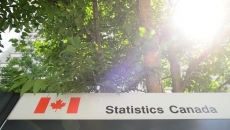OTTAWA - The federal government doesn’t know if its initiatives aimed at reducing chronic homelessness are actually working, says auditor general Karen Hogan.
In a new report, Hogan said no organization has taken the lead on the federal government’s goal of reducing chronic homelessness by 50 per cent by 2028.
The report said Infrastructure Canada and Employment and Social Development Canada do not know whether their programs are improving housing outcomes for people experiencing homelessness.
The auditor general provides oversight to the federal government by conducting audits of its operations and financial accounts.
Hogan released four reports on Tuesday assessing the government's performance on a range of issues, including chronic homelessness, emergency management in First Nations communities, Arctic waters surveillance and cybersecurity of personal information on the cloud.
"When I look at the four performance audit reports we've released today, I see a common thread," Hogan said, namely that government organizations are often slow to use the tools at their disposal to deliver results.
She said data gaps are common across the federal government, making it challenging to assess the progress on different goals.
Hogan said what's most frustrating for her as the auditor general is that federal departments know about these gaps.
"The fact that … there's very little concrete action is possibly the most frustrating thing, in that departments know," she said. "And so, why aren't they taking the actions needed?"
Those gaps made it impossible for the auditor to properly assess whether the federal government was reducing chronic homelessness as promised.
Infrastructure Canada spent $1.36 billion on reducing homelessness as part of the Reaching Home program between 2019 and 2021, and yet the audit found the department didn’t know whether homelessness increased or decreased during that time frame.
Since 2018, the Canada Mortgage and Housing Corporation has spent $4.5 billion as the lead on the national housing strategy. However, the report found that the CMHC doesn’t know who is benefiting from its programs.
The national housing strategy was announced by the Liberals in 2017 as a 10-year, multi-billion-dollar plan to expand affordable housing to more Canadians.
In her assessment, the auditor general also found that some rentals billed as affordable units were not in fact affordable to low-income households.
A unit is considered affordable when rent costs less than 30 per cent of a household’s before-tax income.
However, the average rental price of units approved under the National Housing Co-Investment Fund was higher than that in several provinces and territories.
In Nunavut, the average cost was 46 per cent of household income, while in Ontario and Manitoba, it was above 37 per cent.
The auditor general says Infrastructure Canada and CMHC were not working in a co-ordinated way and their initiatives were not well integrated.
Without co-ordination, the federal government is unlikely to achieve its target of halving chronic homelessness by 2028, the report found.
Hogan's recommendations include collecting and analyzing data on homelessness in a timely manner.
The report says Infrastructure Canada and the CMHC have accepted the recommendations.
"We as a government continue to believe that everyone in Canada has the right to a safe and affordable place to call home," Housing Minister Ahmed Hussen said in a news conference Tuesday afternoon.
The minister acknowledged the government needs to do a better job of collecting information and said an online system has been launched to capture data on chronic homelessness.
He blamed the lack of data on community groups struggling to collect information while responding to the COVID-19 pandemic.






